Are you planning to work in the aviation industry, or simply want to prepare your Chinese vocabulary to make traveling by plane in China easier? Whether you’re a passenger or an airport staff member, knowing how to use Chinese vocabulary about airport and aviation will help you communicate more smoothly and professionally. Let’s explore the essential vocabulary and practical conversation examples with Ni Hao Ma.
Chinese Vocabulary About Airport and Aviation
Aviation is one of the most internationalized industries, where language plays a vital role as a bridge. For anyone learning Chinese, mastering Chinese vocabulary about airport and aviation makes communication in work and travel much easier. Below are some of the most common words you need to know.
Chinese Vocabulary About Airlines
In this section, Ni Hao Ma introduces Chinese vocabulary about airline names in Vietnam and around the world, making it easier for you to recognize and remember when needed.
| Chinese | Pinyin | Meaning |
|---|---|---|
| 越南航空 | Yuènán Hángkōng | Vietnam Airlines |
| 越捷航空 | Yuèjié Hángkōng | Vietjet Air |
| 竹航航空 | Zhúháng Hángkōng | Bamboo Airways |
| 太平洋航空 | Tàipíngyáng Hángkōng | Pacific Airlines |
| 中国南方航空 | Zhōngguó Nánfāng Hángkōng | China Southern Airlines |
| 中国东方航空 | Zhōngguó Dōngfāng Hángkōng | China Eastern Airlines |
| 中国国际航空 | Zhōngguó Guójì Hángkōng | Air China |
| 新加坡航空 | Xīnjiāpō Hángkōng | Singapore Airlines |
| 泰国国际航空 | Tàiguó Guójì Hángkōng | Thai Airways |
| 日本航空 | Rìběn Hángkōng | Japan Airlines |
| 大韩航空 | Dàhán Hángkōng | Korean Air |
| 卡塔尔航空 | Kǎtǎ’ěr Hángkōng | Qatar Airways |
| 阿联酋航空 | Āliánqiú Hángkōng | Emirates |
| 美国航空 | Měiguó Hángkōng | American Airlines |
| 英国航空 | Yīngguó Hángkōng | British Airways |
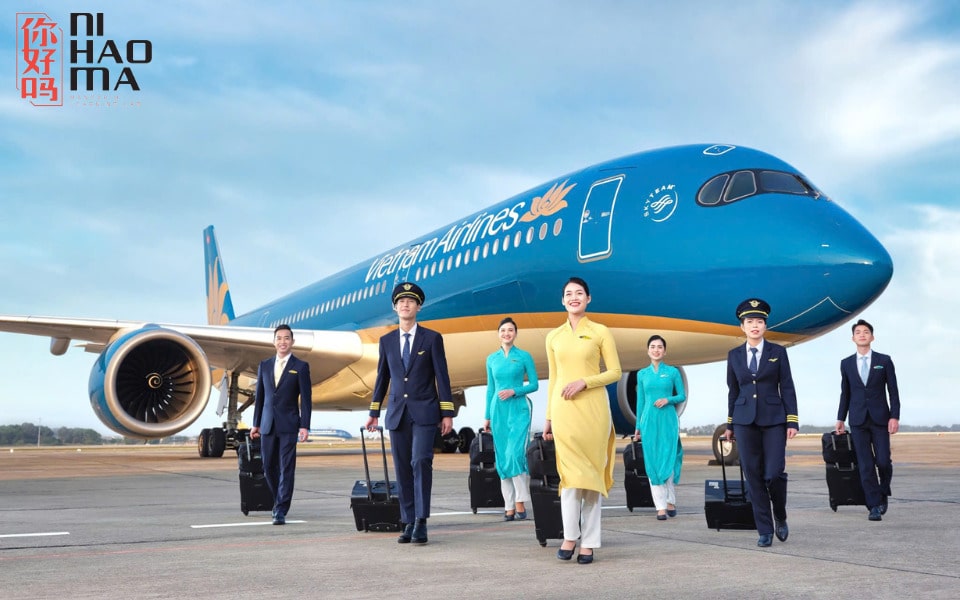
Chinese Vocabulary About Aviation Jobs
The aviation industry includes many different roles, from pilots and flight attendants to technical staff and controllers.
| Chinese | Pinyin | Meaning |
|---|---|---|
| 飞行员 | Fēixíngyuán | Pilot |
| 副驾驶员 | Fù jiàshǐyuán | Co-pilot |
| 空姐 | Kōngjiě | Flight attendant (female) |
| 空少 | Kōngshào | Flight attendant (male) |
| 机长 | Jīzhǎng | Captain |
| 副机长 | Fù jīzhǎng | First Officer |
| 机组人员 | Jīzǔ rényuán | Crew |
| 航空管制员 | Hángkōng guǎnzhì yuán | Air Traffic Controller |
| 地勤人员 | Dìqín rényuán | Ground staff |
| 售票员 | Shòupiàoyuán | Ticket agent |
| 检票员 | Jiǎnpiàoyuán | Ticket inspector |
| 行李员 | Xínglǐyuán | Baggage handler |
| 飞机维修工程师 | Fēijī wéixiū gōngchéngshī | Aircraft maintenance engineer |
| 安检员 | Ānjiǎnyuán | Security officer |
| 机场警察 | Jīchǎng jǐngchá | Airport police |
Chinese Vocabulary About Airport Procedures
When traveling for business or leisure by plane, it’s very important to know the essential Chinese vocabulary about airport and aviation, especially related to airport procedures.
| Chinese | Pinyin | Meaning |
|---|---|---|
| 机场 | jīchǎng | Airport |
| 航班 | hángbān | Flight |
| 航程 | hángchéng | Flight segment / route |
| 航空公司 | hángkōng gōngsī | Airline |
| 机票 | jīpiào | Air ticket |
| 登机牌 | dēngjīpái | Boarding pass |
| 护照 | hùzhào | Passport |
| 签证 | qiānzhèng | Visa |
| 行李 | xínglǐ | Luggage |
| 行李箱 | xínglǐxiāng | Suitcase |
| 手提行李 | shǒutí xínglǐ | Carry-on luggage |
| 托运行李 | tuōyùn xínglǐ | Checked baggage |
| 超重 | chāozhòng | Overweight (luggage) |
| 值机 | zhíjī | Check-in |
| 登机口 | dēngjīkǒu | Boarding gate |
| 安检 | ānjiǎn | Security check |
| 海关 | hǎiguān | Customs |
| 自动售票机 | zìdòng shòupiào jī | Ticket vending machine |
| 检票口 | jiǎnpiàokǒu | Ticket checkpoint |
| 登机 | dēngjī | Boarding |
| 下机 | xiàjī | Disembark |
| 中转 | zhōngzhuǎn | Transit / Transfer |
| 往返 | wǎngfǎn | Round trip |
| 直达 | zhídá | Direct flight |
| 登机时间 | dēngjī shíjiān | Boarding time |
| 起飞 | qǐfēi | Take off |
| 降落 | jiàngluò | Landing |
| 出发大厅 | chūfā dàtīng | Departure hall |
| 到达大厅 | dàodá dàtīng | Arrival hall |
| 候机室 | hòujīshì | Waiting lounge |
| 行李标签 | xínglǐ biāoqiān | Baggage tag |
| 行李传送带 | xínglǐ chuánsòngdài | Baggage carousel |
| 行李提取处 | xínglǐ tíqǔ chù | Baggage claim area |
| 值机柜台 | zhíjī guìtái | Check-in counter |
| 登机桥 | dēngjīqiáo | Boarding bridge |
| 登机口号 | dēngjīkǒu hào | Gate number |
| 航班号 | hángbān hào | Flight number |
| 航站楼 | hángzhànlóu | Terminal |
| 跑道 | pǎodào | Runway |
| 国内航班 | guónèi hángbān | Domestic flight |
| 国际航班 | guójì hángbān | International flight |
| 出境 | chūjìng | Exit (departure) |
| 入境 | rùjìng | Entry (arrival) |
| 安全带 | ānquándài | Seatbelt |
| 座位号 | zuòwèi hào | Seat number |
| 窗口座位 | chuāngkǒu zuòwèi | Window seat |
| 过道座位 | guòdào zuòwèi | Aisle seat |
| 出示证件 | chūshì zhèngjiàn | Present documents |
| 登机广播 | dēngjī guǎngbò | Boarding announcement |
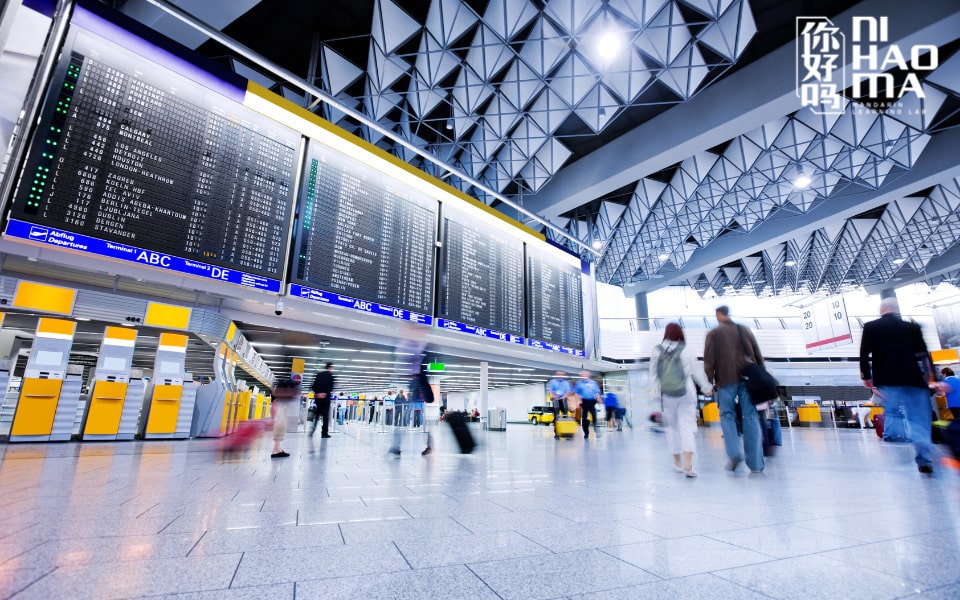
Chinese Vocabulary About Airplane Parts
To better understand Chinese vocabulary about airport and aviation, here is a list of important terms related to airplane parts:
| Chinese | Pinyin | Meaning |
|---|---|---|
| 飞机 | fēijī | Airplane |
| 机头 | jītóu | Nose of the plane |
| 机尾 | jīwěi | Tail of the plane |
| 机身 | jīshēn | Fuselage (aircraft body) |
| 驾驶舱 | jiàshǐcāng | Cockpit |
| 客舱 | kècāng | Passenger cabin |
| 头等舱 | tóuděngcāng | First class / Business class cabin |
| 经济舱 | jīngjìcāng | Economy class cabin |
| 货舱 | huòcāng | Cargo hold |
| 起落架 | qǐluòjià | Landing gear |
| 前起落架 | qián qǐluòjià | Nose wheel |
| 机翼 | jīyì | Wing |
| 副翼 | fùyì | Aileron |
| 襟翼 | jīnyì | Flap |
| 尾翼 | wěiyì | Tail wing / Vertical stabilizer |
| 方向舵 | fāngxiàngduò | Rudder |
| 发动机 | fādòngjī | Engine |
| 螺旋桨 | luóxuánjiǎng | Propeller |
| 喷气口 | pēnqìkǒu | Jet exhaust nozzle |
| 燃油箱 | rányóuxiāng | Fuel tank |
| 机舱门 | jīcāngmén | Aircraft door |
| 应急出口 | yìngjí chūkǒu | Emergency exit |
| 应急滑梯 | yìngjí huátī | Emergency slide |
| 氧气面罩 | yǎngqì miànzhào | Oxygen mask |
| 舷窗 | xuánchuāng | Airplane window |
| 仪表板 | yíbiǎobǎn | Instrument panel |
| 雷达 | léidá | Radar |
| 通讯系统 | tōngxùn xìtǒng | Communication system |
| 自动驾驶仪 | zìdòng jiàshǐyí | Autopilot system |
| 黑匣子 | hēixiázi | Black box (flight recorder) |
| 安全带 | ānquándài | Seatbelt |
| 小桌板 | xiǎozhuō bǎn | Foldable tray table |
| 行李架 | xínglǐ jià | Overhead luggage compartment |
Chinese Vocabulary About Different Types of Aircraft
When exploring the aviation industry, it’s both interesting and useful to know the names of different types of aircraft. Airplanes are not only used for transporting passengers but also play important roles in military operations, research, and rescue missions.
| Chinese | Pinyin | Meaning |
|---|---|---|
| 客机 | kèjī | Civil aircraft / Passenger plane |
| 货机 | huòjī | Cargo plane |
| 军用飞机 | jūnyòng fēijī | Military aircraft |
| 战斗机 | zhàndòujī | Fighter jet |
| 轰炸机 | hōngzhàjī | Bomber |
| 侦察机 | zhēnchájī | Reconnaissance aircraft |
| 直升机 | zhíshēngjī | Helicopter |
| 私人飞机 | sīrén fēijī | Private jet |
| 水上飞机 | shuǐshàng fēijī | Seaplane |
| 无人机 | wú rén jī | Drone (UAV) |
| 波音 | Bōyīn | Boeing (brand) |
| 空中客车 | Kōngzhōng Kèchē | Airbus (brand) |
| 喷气式飞机 | pēnqì shì fēijī | Jet plane |
| 气象飞机 | qìxiàng fēijī | Weather reconnaissance aircraft |
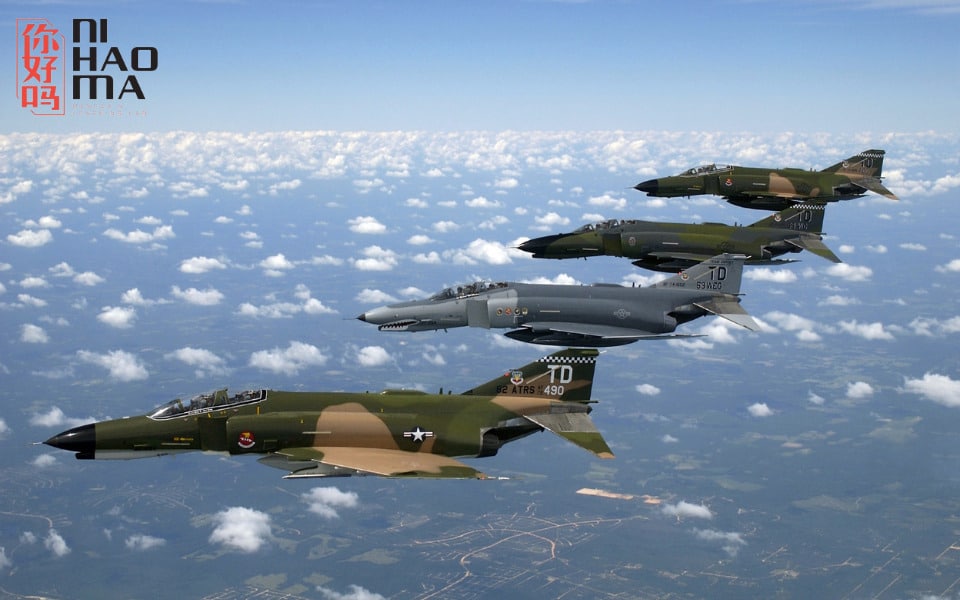
Sample Dialogues in Chinese for Aviation Contexts
Learning through dialogues helps you remember Chinese vocabulary about airport and aviation more effectively. Below are common real-life conversations:
Dialogue 1: Check-in Procedure
A: 您好,我办去上海的登机手续。
Nín hǎo, wǒ bàn qù Shànghǎi de dēngjī shǒuxù.
Hello, I’d like to check in for my flight to Shanghai.
B: 好的,请出示您的护照和机票。
Hǎo de, qǐng chūshì nín de hùzhào hé jīpiào.
Sure, please show me your passport and ticket.
A: 给您。我有两件托运行李。
Gěi nín. Wǒ yǒu liǎng jiàn tuōyùn xínglǐ.
Here you are. I have two checked bags.
B: 好的,请把行李放在传送带上。您还有随身行李吗?
Hǎo de, qǐng bǎ xínglǐ fàng zài chuánsòngdài shàng. Nín hái yǒu suíshēn xínglǐ ma?
Alright, please put your luggage on the belt. Do you have any carry-on luggage?
A: 有,这个背包是我的随身行李。
Yǒu, zhège bēibāo shì wǒ de suíshēn xínglǐ.
Yes, this backpack is my carry-on.
B: 好的,这是您的登机牌和行李标签。您的航班号是 MU587,登机口在23号,登机时间是十点半。
Hǎo de, zhè shì nín de dēngjīpái hé xínglǐ biāoqiān. Nín de hángbān hào shì MU587, dēngjīkǒu zài 23 hào, dēngjī shíjiān shì shí diǎn bàn.
Here are your boarding pass and baggage tags. Your flight number is MU587, boarding gate is 23, and boarding time is 10:30.
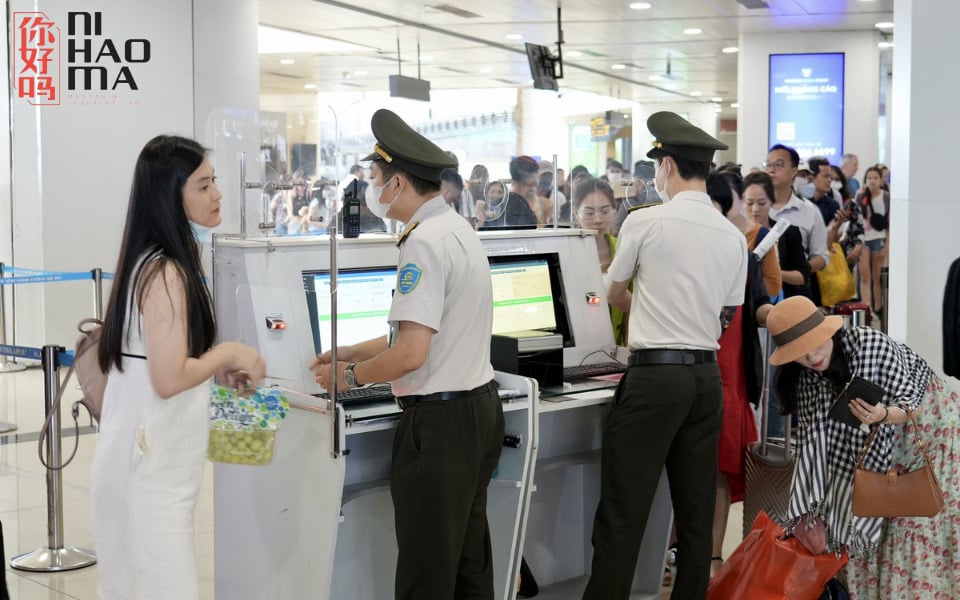
Dialogue 2: Flight Delay
A: 您好,我的航班 CZ307 为什么晚点了?
Nín hǎo, wǒ de hángbān CZ307 wèishéme wǎndiǎnle?
Hello, why is my flight CZ307 delayed?
B: 先生,很抱歉。由于天气原因,该航班起飞时间将推迟。
Xiānshēng, hěn bàoqiàn. Yóuyú tiānqì yuányīn, gāi hángbān qǐfēi shíjiān jiāng tuīchí.
Sorry sir, due to weather conditions, the departure time has been delayed.
A: 那大概要推迟多久?
Nà dàgài yào tuīchí duōjiǔ?
How long will the delay be?
B: 预计新的起飞时间是下午四点。给您造成的不便,我们深表歉意。
Yùjì xīn de qǐfēi shíjiān shì xiàwǔ sì diǎn. Gěi nín zàochéng de bùbiàn, wǒmen shēn biǎo qiànyì.
The new estimated departure time is 4 p.m. We sincerely apologize for the inconvenience.
A: 好的,谢谢。
Hǎo de, xièxiè.
Alright, thank you.
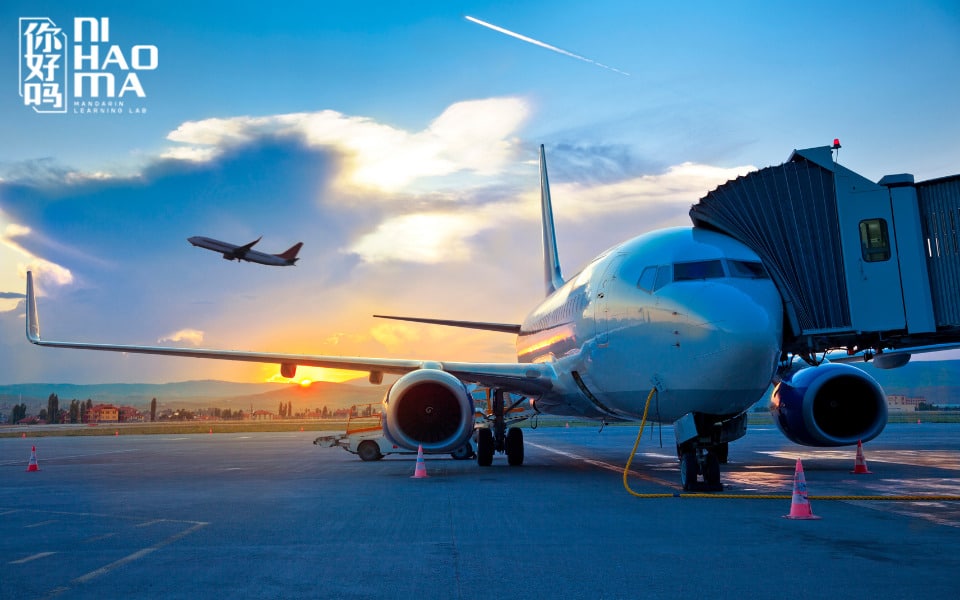
Dialogue 3: Changing a Flight
A: 您好,我想更改我的航班。
Nín hǎo, wǒ xiǎng gēnggǎi wǒ de hángbān.
Hello, I’d like to change my flight.
B: 请问您的订单号是多少?
Qǐngwèn nín de dìngdān hào shì duōshǎo?
May I have your booking number?
A: 订单号是 859632。我想把明天的航班提前到今天下午。
Dìngdān hào shì 859632. Wǒ xiǎng bǎ míngtiān de hángbān tíqián dào jīntiān xiàwǔ.
My booking number is 859632. I want to move tomorrow’s flight to this afternoon.
B: 好的,我为您查询一下。请稍等。您需要支付一些改签费。
Hǎo de, wǒ wéi nín cháxún yíxià. Qǐng shāoděng. Nín xūyào zhīfù yīxiē gǎiqiān fèi.
Okay, let me check for you. Please wait a moment. You’ll need to pay a change fee.
A: 没问题,一共多少钱?
Méi wèntí, yīgòng duōshǎo qián?
No problem. How much is it in total?
Conclusion
We hope that the Chinese vocabulary about airport and aviation and the practical dialogues provided by Ni Hao Ma will be a valuable resource for you. By learning these aviation-related terms, you’ll have a powerful tool to overcome language barriers and communicate effectively with colleagues, partners, and Chinese-speaking passengers. Keep practicing regularly to make these words part of your long-term memory!



